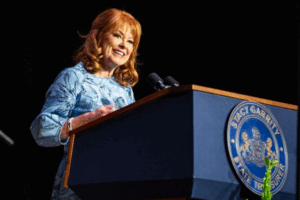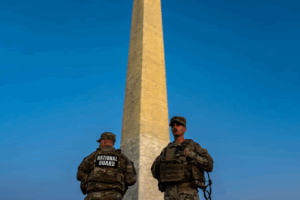The Inquirer and Tribune are bucking the trend of larger regional papers declining to endorse in 2024.
With one week left until Election Day, and millions of Americans having already voted early, two Philadelphia area newspapers announced their endorsement of Democratic nominee Vice President Kamala Harris for president.
The Philadelphia Inquirer’s endorsement of Harris detailed what it considered were stark contrasts between her and her Republican opponent former President Donald Trump, saying Harris “wants to help all Americans. Donald Trump wants to help himself.” The Inquirer lauded Harris’ policy proposals, including her plans to address housing affordability, which has been criticized as likely making the housing crisis worse.
Similarly, The Philadelphia Tribune cast the election as a clear-cut difference between “a convicted felon who tolerates” violence and Harris, a career “prosecutor upholding the law.” The Tribune’s endorsement characterized the race as a choice between “diversity” or “an intolerant monoculture and right-wing censorship.”
The endorsements come as many large and national papers have made the decision not to make endorsements in the 2024 presidential election. Last Friday, the Washington Post announced it will not provide an endorsement for Trump or Harris, with publisher William Lewis saying the paper historically did not endorse candidates before 1976. Lewis argued “we had it right before” the 1976 endorsement of Jimmy Carter, “and this is what we are going back to.”
On the West Coast, the Los Angeles Times declined to endorse a candidate at the directive of its owner Dr. Patrick Soon-Shiong, who told the editorial team to “draft a factual analysis of all the POSITIVE AND NEGATIVE policies by EACH candidate during their tenures at the White House, and how these policies affected the nation.” Soon-Shiong said the Editorial Board decided not to pursue his instructions. In protest of the decision not to endorse a presidential candidate, the Times’ editorials editor resigned. She was soon joined by other members of the Editorial Board.
Most recently, USA Today, which has only endorsed a candidate once since its founding in 1982, announced it would not endorse in 2024. Instead the paper intended to inform “readers with the facts that matter and the trusted information they need to make informed decisions.”
While both the Post and Times received “condemnation from their liberal readers”, according to Fox News, “Real Time” host Bill Maher mocked those outraged over the lack of endorsements, saying “it’s charming they think it matters to anybody.”
Uproar and consternation over newspapers ending the practice of endorsements is not unique to this election cycle. In 2022, a large network of influential newspapers owned by Alden Global Capital said they would not provide endorsements for president, governor, or the U.S. Senate. Some of the papers under the aegis of Alden include the Chicago Tribune, Boston Herald, and New York Daily News.
Some have questioned the financial value of endorsing candidates when, in the precarious economic uncertainty of traditional news media, “picking a candidate…may alienate more readers than it persuades.” Yet, others argue that by not endorsing Vice President Harris, these papers are tacitly endorsing Trump, “bending the knee to America’s aspiring autocrat.”
The argument over the value of media endorsements in the 2024 presidential election is not occurring in a vacuum. An October survey by Gallup showed more Americans have no trust and confidence “at all” when it comes to the news media “reporting the news fully, accurately and fairly” than those who do. 36% of respondents said, “none at all” when asked about their trust, while 33% said “not very much” and only 31% said they had a “great deal” or “fair amount” of faith in the media.





